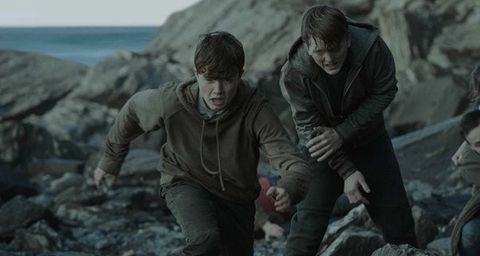Paul Greengrass made the definitive Sept. 11 movie with United 93, a harrowing and unflinching look at organic heroism in the face of unexpected terror. That film was a powerful and visceral glimpse into the chaos of the fateful morning, one that avoided melodrama to capture authentic emotion in its portrayal of true-life events. Greengrass continues his own explorations of the human response to terrorism with the equally raw and compelling new 22 July, and while the location shifts from America to Norway, Greengrass -- as both a director and a storyteller -- finds similar truths and contemporary fears in both narratives.
The deadliest attack in Norway's history since World War II occurred on July 22, 2011, when lone-wolf terrorist Anders Behring Breivik conducted a two-pronged attack against the country's government. Breivik (portrayed with an icy charisma by Anders Danielsen Lie) first distracted law-enforcement officials with a car bomb placed in the executive government quarters of Oslo.
While the community reacted with the expected fear and confusion, Breivik made his way to the island of Utoya, where a popular summer camp was being conducted. Posing as an officer, Breivik opened fire on the unsuspecting campers and counselors. When all was said and done, Breivik's murderous rampage claimed the lives of 77 total Norwegian citizens, many of them in their teens and early 20s.
Those already anticipating some stomach-churning shaky cam generated by Paul Greengrass' usual, preferred handheld approach to filmmaking will appreciate that the director abandons most of his visuals tricks, understanding that his subject matter was urgent and visceral enough to perform the heavy lifting needed in 22 July. Also, unlike United 93, Greengrass here chooses to lead with the terrorist attack at the heart of the story, plunging the audience into the tension and shock of an unexpected attack, then settling into the aftermath.
You see, 22 July isn't so much a movie ABOUT the attack (though it is depicted with gut-wrenching tension and genuine horror, making the island sequence one of the year's most terrifying experiences). Paul Greengrass has evolved beyond the perspective formed in United 93, and now focuses more on the reality of surviving a traumatic event. That painful and difficult journey is personified by the fantastic Jonas Strand Gravli, playing Viljar, a survivor of the Utoya attack. Concerned with protecting his younger brother, Viljar took multiple gunshots to his head and extremities. Breivik left him for dead on the shores of that island, but Viljar survived, and 22 July becomes as much the story of his recuperation as it does about the legal ramifications of Breivik's crimes.
22 July assumes a grim but realistic position. It basically assumes that we, as an audience, now accept that public shootings are a reality that we must contend with on a daily basis (a fact probably more relevant in the United States than in Norway, where gun violence is still a tragic shock, and not the norm). One weighty takeaway from Greengrass' recount of the horrific attack in Oslo is that, at any given moment, your life can be permanently altered by the whim of an insane stranger. One minute, your attending camp with close friends. The next, you're injured beyond repair, forced to contend with crippling injuries that may fade but never heal, with no real reason given for the pain you now have to endure.
Though the attack that prompts the conversation in Paul Greengrass' 22 July might have bene senseless, the movie is anything but. Greengrass takes a measured approach to a horrific event, pulling no punches as he presents the tragedy, but carries viewers through the next stages where 22 July analyzes HOW these attacks -- more prevalent now than they even were in 2011 -- continue to affect us. The story might be specific to Oslo. But in Paul Greengrass' hands, the excellent 22 July becomes universal in its painful and powerful lessons of preparedness, of frustration, and of human resilience and perseverance in the wake of tragedy.

Sean O’Connell is a journalist and CinemaBlend’s Managing Editor. Having been with the site since 2011, Sean interviewed myriad directors, actors and producers, and created ReelBlend, which he proudly cohosts with Jake Hamilton and Kevin McCarthy. And he's the author of RELEASE THE SNYDER CUT, the Spider-Man history book WITH GREAT POWER, and an upcoming book about Bruce Willis.
Most Popular



